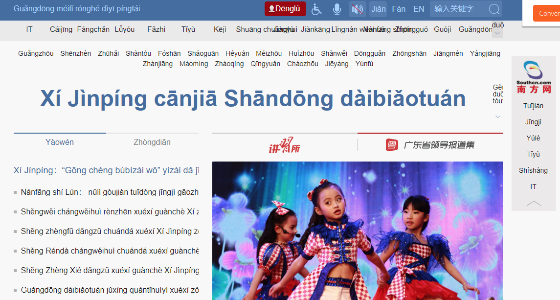Characterless future
« previous post | next post »
Browser extensions sometimes can cause unexpected problems, e.g.:
"The Time of Shedding and Cold Rocks" (3/7/18).
Often, however, they can be very helpful if they do what you want them to do.
Jonathan Smith writes:
Do you use the web browser Chrome? If so try adding the extension "Convert Chinese to Pinyin (Mand)". It does a decent job converting Chinese-language web pages to word-spaced pinyin (with tone marks if desired) so one can pretend one lives in a characterless future :D
Below are screenshots of the Nanfang ribao (Southern Daily) homepage before/after screenshots. Maybe this is old news and lots of equivalent tools are out there, but I had not seen it…
I was not aware of this tool and I do not know of any others that do something similar, certainly not as well as this Chrome extension. So I was indeed very happy to learn about it. Now I can imagine what a characterless future might look like. Seriously, though, I can recommend this as a handy device for fluent speakers of Mandarin who don't know characters but need to get the gist of Chinese texts. And it's one more weapon in the rapidly growing pedagogical arsenal available learners who wants to enhance their reading skills.


Philip Taylor said,
March 9, 2018 @ 1:54 pm
Now that is a useful tool; if only it were available for Seamonkey as well as Chrome …
reader_not_acedeme said,
March 9, 2018 @ 2:12 pm
I am curious to know how good the generated Pinyin is. I've been giving character>Pinyin conversion a lot of thought, and from an NLP perspective, it seems to be a hard task:
– The conversion is obviously highly ambiguous
– There are no datasets (AFAIK) to train and evaluate automated approaches
So I'm very excited to hear, at least on an anecdotal / subjective level, how well this plugin performs when you actually read the text.
Jonathan said,
March 9, 2018 @ 2:40 pm
Could you include a direct link to the plug-in installation page, hopefully on a fairly trustable host? My initial Google search seemed to turn up several near matches and I couldn't pick out which one was the one Jonathan Smith was recommending. Thanks.
Frans said,
March 9, 2018 @ 2:47 pm
@Philip Probably not too hard. Unfortunately the license seems to be closed in spite of plans to open it up.
@Jonathan I only see this one exact match?
Alexander said,
March 9, 2018 @ 2:57 pm
I'm not the original poster, but searching for the exact name, with quotes, nearly unambiguously finds https://chrome.google.com/webstore/detail/convert-chinese-to-pinyin/nhhoiplgolfammoegggnjojoaljjbojg?hl=en
Michael Watts said,
March 9, 2018 @ 4:25 pm
What happened to the 审议 in the headline? Tools like this frequently make errors on tone, pronunciation, or word boundaries… but just leaving out the last word?
Jonathan Smith said,
March 9, 2018 @ 5:17 pm
The last word just didn't fit. Yes it makes numerous, sometimes quite ridiculous, errors. I wish there were a way to provide easy feedback on these through the tool itself… it would not take many (reasonably knowledgeable) user hours to make something quite powerful.
liuyao said,
March 9, 2018 @ 11:49 pm
Cool! That's something Google could easily do. Getting the word grouping and pronunciation (for polyphonic characters) should be much easier than getting the translations right.
Now we could finally put it to test: Can you really read through an article without scratching your head for characters? They probably would need to retain characters for proper nouns (personal and place names).
liuyao said,
March 9, 2018 @ 11:52 pm
I wasn't aware of this one, but I've known about another Chrome extension called Pinyinizer, should anyone want to compare. https://chrome.google.com/webstore/detail/pinyinizer/dkmlhgmmfochpgplckjlfakepmmhpaep?hl=en
Alex said,
March 10, 2018 @ 12:22 am
Seems only a matter of when not if, unfortunately for my sons the when wont happen fast enough.
Jonathan Smith said,
March 10, 2018 @ 12:55 am
@liuyao Newspaper articles are 100% readable. Actually I can tell already that if I read Chinese like this for maybe a week or so I will be able to process it faster than characters :/ Mistakes involve minor parsing issues (*zàiwài jiè kànlai > zài wàijiè kànlai…), "poyinzi" errors (*zhòng kǒu nán diào > zhòng kǒu nán tiáo…)… and right, personal names are often not picked up on (i.e., uncapitalized, irregularly spaced) and naturally you won't know the characters they contain. Some of this is simply a function of only being as good as the dictionary at all, but some calls for "smarter" use of context.
I believe Pinyinizer annotates, which is the traditional pedagogical apparatus of course. Replacement is more radical and intellectually interesting in my view.
Jonathan Smith said,
March 10, 2018 @ 12:58 am
*only being as good as the dictionary at hand, I guess I meant
Incidentally, reading pinyin text aloud at speed to certain native Chinese readers/speakers can lead to extreme befuddlement bordering on existential angst — I highly recommend it :D
Alex said,
March 10, 2018 @ 1:41 am
The unfortunate thing here in China is that its hard to update chrome and add ons for regular folk without VPN. It would be interesting to see Saturday Chinese schools in countries outside of China try it as I'm sure there are many like me who can speak have limited reading and non existent writing ability.